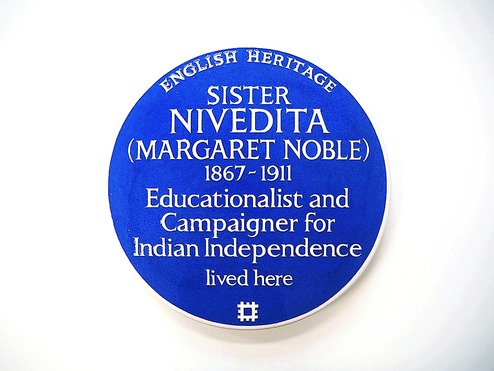
London: Sister Nivedita will join a select group of Indians when her blue plaque is unveiled by Mamata Banerjee in London on Sunday.
The plaque reads: "Sister Nivedita (Margaret Noble)/ 1867-1911/ Educationist and campaigner for Indian independence lived here."
The property in Wimbledon, southwest London, now includes a café at street level. It is one of three houses in the area where Sister Nivedita lived. This one was picked because it is on the High Street and most visible to passers-by.
"A plaque flags up a building and means less harm will come to it --- it has a conservation angle," said Howard Spencer, historian for English Heritage, a trust that manages historic buildings, monuments and sites.
Blue plaques, the only scheme of its kind in the world, were established in London in 1866. In all there are some 920 blue plaques, "which, over 150 years, means it's an honour (to get in)".
"We get hundreds of nominations but we put up plaques to about 12 in a year," Spencer said.
"It is an important part of the fabric of London. The current rule is, one per person and (it) can be erected at least 20 years after that person has died."
The nominations are debated by a panel of 12 experts, short-listed and carefully researched. "We have honoured people who have taken part in the broader Indian freedom struggle," Spencer said.
He ran through some of the Indian names: Rabindranath Tagore, Mahatma Gandhi, Swami Vivekananda, Jawaharlal Nehru, Vallabhbhai Patel, Sri Aurobindo, Bal Gangadhar Tilak, V.D. Savarkar and V.K. Krishna Menon.
Sister Nivedita is in good company: others who have merited plaques this year include Charlie Chaplin, "the UK's first movie star"; the actor John Gielgud; Russian ballet dancer Rudolf Nureyev; and Lady Reading, who set up the Women's Voluntary Service "and whose husband, Lord Reading, had been Viceroy of India (1921-25)", Spencer said.
There are hopes of adding Britain's first Asian MP, Dadabhai Naoroji, to the list. "There is also a plaque to Annie Besant, an Englishwoman who played a part in securing independence," Spencer said.
"Sister Nivedita was born in Northern Ireland. It was thought (by the selection panel) to be an interesting story. She is a very well-known name in India; she is much less well known here (although) there is already a plaque to her in Northern Ireland."
Spencer quipped: "It's about time a woman was honoured."

